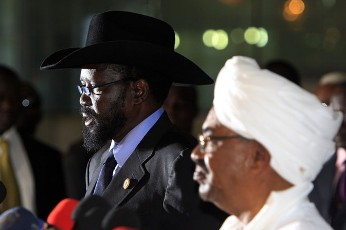Bashir to visit South Sudan after key security meeting
October 3, 2012 (KHARTOUM) – Sudan President Omer Al-Bashir is planning to visit South Sudan following a high-profile security meeting between the two countries this month, an envoy said on Thursday.

The deal is part of a series of agreements the two countries signed on issues arising from the secession of South Sudan from Sudan last year, including oil, citizenship and trade. The security agreement provides for the establishment of a buffer demilitarized zone along the unmarked 1800 km common borders. It also renews the commitment of both parties to refrain from supporting rebel group in the other state.
The South Sudanese diplomat, who was speaking in a symposium organized by the Sudanese Union of Students in Khartoum, elaborated that the security meeting between the joint security and military committee of Sudan and South Sudan will also discuss ways of severing ties between the South Sudan and the Sudanese rebel Sudan People’s Liberation Movement North (SPLM-N) which fought as part of South Sudan army during the north-south civil war in the former united Sudan.
The SPLM-N is fighting the Sudanese government in the regions of South Kordofan/Nuba Mountains and Blue Nile which border South Sudan. Khartoum maintains that implementing the security arrangements and ending South Sudan relations with the rebels is a top priority.
Madot also revealed that President Al-Bashir and his South Sudanese counterpart Salva Kiir Mayardit held a phone conversation on Tuesday and discussed ways of implementing all the agreements signed on the ground. He further said that Al-Bashir is preparing to visit Juba during this month and following the security meeting.
The ambassador downplayed talk by some South Sudanese officials and SPLM-N rebels against the agreement. “The two presidents know what they need to do at this time and we don’t want to reveal everything even if it’s positive because they are related to specific timeframes and serious moves by international quarters to settle all the issues”
He went on to say that the two governments are determined to have the agreements approved before their parliaments within 21 days, adding that some parts of the agreement do not require endorsement by the parliament. Madot noted that South Sudan’s council of ministers already approved the agreements.
Speaking in the same symposium, the member of Sudan’s negotiating delegation Al-Muiz Farouq voiced optimism that future talks between the two countries will produce an agreement on the issue of Abyei despite the fact that the two countries failed to break the deadlock over the hotly contested region after Khartoum rejected a proposal from African Union mediators to hold a referendum in Abyei to determine its status.
“Abyei issue can be resolved in an optimized way” Frouq said. He also said that the oil agreement will help Sudan receive 6 billion US dollars from South Sudan and the international community to make up for the country’s loss of three quarters of its oil production when South Sudan seceded last year.
The Sudanese official criticized the orchestrators of a domestic campaign against the citizenship agreement and the issue of the four freedoms of movement, work, residence and ownership that were granted to citizens of both countries in the other.
According to Frouq, those leading the campaign are speaking from the comfort of their residences in Khartoum and they do not care about the fate of millions of Sudanese residing along the common borders with South Sudan.
Khartoum is trying to contain a campaign by the far-right and anti-South Sudan Just Peace Forum (JPF) to scuttle the four freedoms deal. The increasingly influential JPF and its mouthpiece Al-Intibaha newspaper vowed to oppose the deal and mobilize Imams of mosques to preach against it.
(ST)
